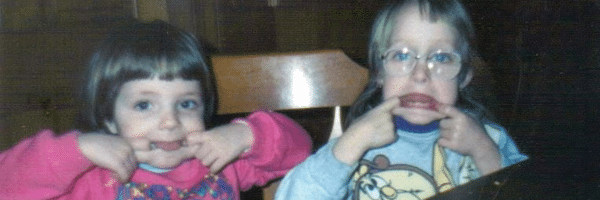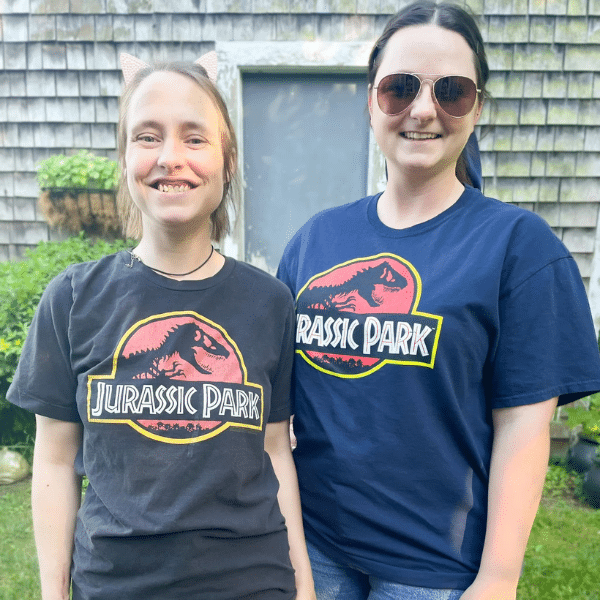Abby Burke went under the knife for the first time this year.
Considering the 33-year-old was too scared for anesthesia during her wisdom teeth removal, this was a daring choice for the national account executive at Hanson, Massachusetts-based distributor Walker-Clay, PPAI 100’s No. 76 distributor.
But if you’re one of her 350,000 TikTok followers, you know the social media influencer – whose cake decorating videos went viral during COVID – took it upon herself to go through the testing process to help save her big sister, Libby, who had been on dialysis for the past four years.
“My sister has had so many surgeries,” Burke says, “so I couldn’t be a little bitch about it.”
‘Emergency Situations’
Born prematurely, Libby, 35, has suffered from low kidney function her entire life.
As a result, Boston Children’s Hospital became a second home. During the summer before high school, Libby received a kidney donated by her dad. The organ lasted until the pandemic, when she was put on dialysis. “She started getting into some emergency situations,” Burke says. “They were moving her port around, and it was developing scar tissue. Sometimes, they couldn’t even get it through.”

Even though there was concern that Libby’s body wasn’t healthy enough for surgery, Burke decided to get tested to see if her kidney was a match.
She had always figured she’d be next up in the family to donate. Although she has two kids of her own, her younger sister, Becca, has four children – one of whom has medical challenges. God forbid the child needs a kidney one day, she wanted Becca to be able to deliver.
Of course, her family was still worried about the procedure. “I spent a lot of time researching the stats and the hospital I was doing it at,” Burke says. “It actually would’ve been a riskier surgery to have my tonsils removed than to have my kidney taken out.”
- According to a study published by the American Medical Association last year, only 36 out of 164,593 living kidney donors (0.02%) died within 90 days of surgery – the most common cause being hemorrhage.
So, Burke went through the National Kidney Registry, an organization dedicated to increasing living kidney donation, ensuring better donor-recipient matches and providing comprehensive support and protection for living donors.
- Since 2007, NKR has facilitated more than 10,000 kidney transplants, including 1,744 transplants last year, which represent more than a quarter of all U.S. living kidney donor transplants.
Burke says it was an easy process: NKR shipped blood lab kits to her home, and a representative handled the rest. She also underwent numerous mental health screenings to gauge how she’d feel if she donated and the recipient didn’t take to her kidney. “They make sure you’re in a good place to do it – you can back out at any time,” she says.
Having an O-positive blood type, Burke is considered a universal donor. That’s why she was crushed to learn she wasn’t a match for her sister.
“The doctors said it was too risky because Libby had so many antibodies and only three of ours matched,” Burke says.
Paired Exchange
Despite the setback, Burke (and NKR) was hell-bent on her kidney being donated. Because even if your donor doesn’t match, there are multiple ways to still go about the process.
One of the options is the standard voucher program. This allows you to donate to someone in need while your family member or friend in need receives a voucher for a transplant. When the voucher is redeemed, the voucher holder will be prioritized for a living donor kidney through NKR.
Burke likens it to a fast pass at an amusement park. “If you need a kidney and you have somebody willing to donate on your behalf even if they’re not a match, then it puts you at the front of the line,” she says.
The voucher route can happen quickly – you may have the surgery within six weeks. But Burke’s mom feared that Libby still might not receive a kidney transplant even with the voucher, so they agreed to do the more complex option: a paired exchange.
Here’s how a paired exchange works: When a person (Recipient A) is in need of a kidney and has a willing donor, but the donor is either a poor match to Recipient A or not a match at all, NKR can find an eligible recipient who also has a willing donor who’s either a poor match or not a match at all.
Then, they swap. Typically, all the surgeries in a paired exchange happen on the same day. And, in the “extremely rare case” they ever need a kidney transplant in the future, all NKR paired exchange donors are prioritized for a living donor transplant.
“It’s an incredible system that saves lives through connection and generosity,” Burke says.
On the morning of April 10 at Brigham and Women’s Hospital in Boston, Burke donated her kidney. Several hours later, her sister received one. Both operations were successful.
(Small) Road To Recovery
Burke returned to the office full time on May 5.
She was tired, but productive. “I didn’t want to be sitting at home,” she says. “The first week after surgery, standing up wasn’t fun. Then the week after, the kids had vacation, so I was really busy. But, as soon as they went back to school, I was bored.”
Libby recovered even quicker. It took the new kidney a week or so to acclimate, Burke says, and as soon as it did, Libby lost 12 pounds of fluid gained from the dialysis.
“My sister is the most content person there is,” Burke says. “She’s so happy with her life. She likes her job, loves her animals and loves reading her books. My son and her are great together. They play Mario Kart and eat chicken nuggets. It’s adorable. She’s a kid at heart for sure.”
Although Libby is off dialysis, she has a low white blood cell count. Burke says it’s common for recipients due to anti-rejection medications that suppress the immune system, but it’s annoying to deal with, as it requires balancing the medications and doing lab work more often.
As a result, Libby has yet to return to her job as a cashier at the local grocery store, where she has become something of a celebrity over the years. “People ask me how she’s doing when they notice she hasn’t been there because they specifically look for her checkout line,” Burke says.

When Libby’s blood cells normalize, the sisters have some goals to achieve, including seeing Jurassic World Rebirth at the movie theater.
They intend to write a letter to the other parties involved in the paired exchange. Because of HIPPA compliance, neither the hospital nor NKR is allowed to share the identities of the person who received Burke’s kidney or the person who donated Libby’s kidney.
However, Burke and her sister can send a message through NKR that they wish to connect. It’s up to the other parties if they want to accept the letter.
“I have no idea who they are,” Burke says. “I don’t know where they’re located, but we know my sister’s kidney was on a plane that went through Chicago. All we know is they’re a similar pair. You have to go into it with the knowledge that you may never know who you donated to. My sister and I would both love to know.”
They’re also planning to record a video about the entire experience, which should come as no surprise if you’re one of Burke’s 60,000 YouTube subscribers.
@its_abby_abigail The organs also need to fall back into place after being moved around for the surgery. Did I wake up with an accent or something?? #kidney #kidneydonor #kidneytransplant ♬ original sound – Abby
A member of PPAI’s 2025 #Online18 and the 2024 Coolest People In Promo, she has documented the journey over the past several months, connecting with others interested in donating their kidneys and those desperate to receive.
- Shifting away from cake decorating, her focus now is on user-generated content for brands, reviewing products available through TikTok Shop and expanding her social media presence in the promotional products industry.
- She also hosted the YouTube Creator event in Portland, Maine, on May 13.
“Whenever I do something I’m passionate about, I go to social media immediately,” she says, adding that Libby granted her permission to go public with the situation. “It more so came from the fact that people don’t realize how easy [the surgery] was. There’s no impact on me. My other kidney picks up the slack and gets stronger. I don’t change my diet or do anything differently. I have a follow-up in six months and then another in two years.”
Spreading Awareness
Burke aims to use her story and platform to educate others about kidney donation.
The biggest misconception that she wants to clear up is the importance of needing a match. “If you need a kidney, you just need a willing donor,” she says.
“I’m pretty sure if you don’t have a willing donor with you, you’re on the list for a deceased kidney. That’s great, but it’s not from someone who did all the testing I did. The doctors know right away that I’m very healthy [Burke plays soccer and softball] and that my kidney is in really good shape.”

She also recommends going through NKR, which currently has more than 100 member centers spanning 35 states and Washington, D.C. For those who qualify, hospitals that align with NKR may offer Donor Shield, a benefits package that Burke is grateful to have taken advantage of.
- Donor Shield paid 100% of her salary while she was out, plus expenses like parking for appointments and childcare she relied upon during recovery.
“More people would donate if they heard it’s not that big a deal,” Burke says, “and maybe people looking for a kidney would be less stressed if they knew they just needed somebody willing to donate. They just need a healthy person to do it, and then they can figure out which option is best.”
The last goal on her list is to dust off her apron. Before Libby’s most recent kidney failure, Burke baked her a Reese’s chocolate peanut butter cake for her birthday. But over the past four years, her sister has been denied her favorite combination because its high content of potassium and phosphorus can cause complications while on dialysis.
So, when Libby turns 36 in September, her sister will have another gift ready.
“I haven’t baked a cake in a while,” Burke says, “but I’m going to make that one.”


